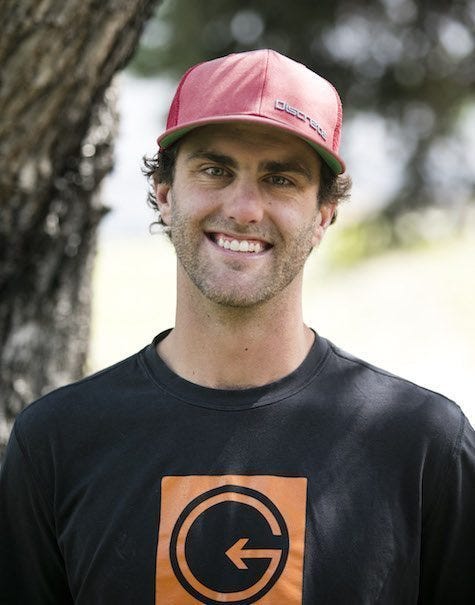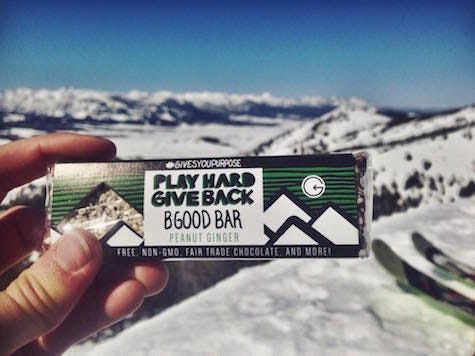Entrepreneur Partners With Athletes Passionate About Their Sport and the World Around Them
Written by Alison Klein
In ancient Greece the Olympic ceremony was linked to the cult of Zeus, and though athletes were (obviously) mortal, victory immortalized them. We don’t involve Zeus in today’s athletic festivities, but there’s still a sense of awe and admiration elicited by athletic accomplishment.
Athletes like Michael Jordan and Serena Williams do things that shatter our concept of possible. While their feats border on superhuman, the exciting thing is their humanity: They’re just people like you and me.

Spencer Brendel is no Michael Jordan (sorry Spencer!), but he spent his fair share of time in the limelight. He played hockey throughout his youth in Sun Valley, Idaho, and enjoyed a solid hockey career, playing for a year in the Swedish junior league and for four years at the University of St. Thomas in Minnesota.
Throughout his youth, Brendel accompanied his grandparents to developing nations where they carried out humanitarian work. As he grew older, Brendel became hyper-aware of how much time he spent developing himself into an elite hockey player compared with the time he spent helping others.
The summer of his junior year in college, Brendel took a road trip with his dad and came up with PlayHard GiveBack: an initiative that would help athletes match their dedication to bettering themselves with a dedication to bettering the lives of others. Brendel applied for and won a Wild Gift Fellowship, a program that provides funding and mentorship to aspiring social entrepreneurs.
It’s been years since Brendel retreated into the wilderness with other social entrepreneurs to kick-start his project. It hasn’t been easy, but the resilience and drive Brendel cultivated as an athlete have served him well in his quest to help those who play hard and give back. He shares a bit of what he learned along the way.
RoundPeg is part of the community of Certified B Corporations. Learn more about this growing movement of people using business as a force for good, and sign up to receive the B the Change Weekly newsletter for more stories like this one, delivered straight to your inbox once a week.
Know When to Adjust Your Model
PlayHard GiveBack (PHGB) has undergone several changes since its start. As Brendel put it, “We like to fail fast and often here.”

Initially, Brendel wanted to help athletes fund their training and causes. He introduced a model where athletes could create and promote proprietary trail mixes to sell in their communities: 20% of the profits would go to support their training, 20% would support a cause of their choice. They could promote the products to their fans and admirers to support their cause.
Brendel soon discovered the delightful challenge of scalability. Sourcing so many different ingredients and printing different bags with different pictures and different labels wasn’t scalable. So PHGB pivoted and offered three generic types of trail mix through a direct-to-consumer model. The goal was to take the retail profit margin and put it back into the athlete and the cause.
Even athletes who aren’t what you’d call “famous” have huge followings on social media, and Brendel hoped that with the new model they’d be able to promote the products through social channels to draw widespread attention. It was around this time that Brendel learned another good lesson: Athletes aren’t necessarily salespeople. Most of the athletes working with PHGB were less comfortable promoting trail mix than launching themselves off 394-foot ski jumps. Go figure.
At one point, PHGB even dabbled in helping young athletes raise money. Kids could sell the trail mix to raise funds for tournaments, equipment and other needs, all while learning the importance of eating healthy and giving back. Unfortunately, Brendel soon found that there were too many hoops to jump through, even for a guy with his agility. Between the coaches, parents, foundation and board approvals, the process was just too slow. It was failing, but it wasn’t fast.
Brendel pivoted the business again and stumbled upon PHGB’s newest approach — working with the hospitality industry. By partnering with upscale hotels, he has secured consistent demand for his inventory. They use the trail mixes as complimentary gifts and stock them in minibars for their clientele to enjoy. Things are good, and this model is working.
Find a Way to Connect With People
When people buy from PHGB, they’re aware that they’re not just buying a product — they’re becoming part of a movement. Brendel finds that athletes actually want to sport PHGB apparel because they realize what it means. “It’s different than wearing a T-shirt with your favorite cereal on it.”

Brendel has found success inspiring athletes to give back by helping them take action around their values. Along the way, certain trends have emerged. The first is concern for the environment. Brendel works with a lot of athletes involved in lifestyle sports — surfing, skiing, snowboarding, triathlons and the like. These sports depend on the maintenance of the natural environment for their viability. You can’t ski when there’s no snow. No one wants to surf in an oil slick.
Motivated by their connection with the natural world, athletes have partnered with PHGB to give to organizations like Willie Neal Environmental Awareness Fund, The Climate Reality Project, Adventurers and Scientists for Conservation and Protect Our Winters.
The second big trend is a focus on physical healing and wellness. According to Brendel, these initiatives resonate with athletes. “They’re taking huge risks on a day to day basis,” he says. “Life-altering injuries are a potential reality for them, so they’re very in touch with these causes.” Inspired by this reality, many of the athletes choose to support organizations that empower athletes like the High Fives Foundation, SheJumps, the Flyin Ryan Hawks Foundation and Skiku.
Back when the model was a 50/50 split between athletes and causes, some athletes donated all of the proceeds to their cause. Today, some endorse a cause and leave it at that while others volunteer time, donate their own money and really champion the organizations they’re supporting.
Connecting Through Sports
Brendel told me that he views sport as a unique medium for communication. “It doesn’t matter if you’re white or black or anything else,” he says. “Sport generates a connectivity between people that not much else does.” It transcends linguistic and cultural boundaries to generate connection and admiration from others. By giving back, athletes can channel that admiration and make it a force for positive change.
Athletes are known for their tenacity, resilience and drive. They live by mantras like “Champions keep playing until they get it right” (Billie Jean King) and “You miss 100 percent of the shots you don’t take” (Wayne Gretzky).
That kind of unapologetic determination isn’t just good on the slopes and the court — it’s essential to those who want to create significant social change. The work Brendel does sets an example for athletes who want to give back but it also sets an example for social entrepreneurs. Victory isn’t easy and failure is almost assured. But his story proves that making change isn’t, as Vince Lombardi would say, about whether you get knocked down — it’s about whether you get up.
This article was originally published by RoundPeg. B the Change gathers and shares the voices from within the movement of people using business as a force for good and the community of Certified B Corporations. The opinions expressed do not necessarily reflect those of the nonprofit B Lab.

PlayHard GiveBack: The Social Enterprise That’s Changing the Game was originally published in B the Change on Medium, where people are continuing the conversation by highlighting and responding to this story.